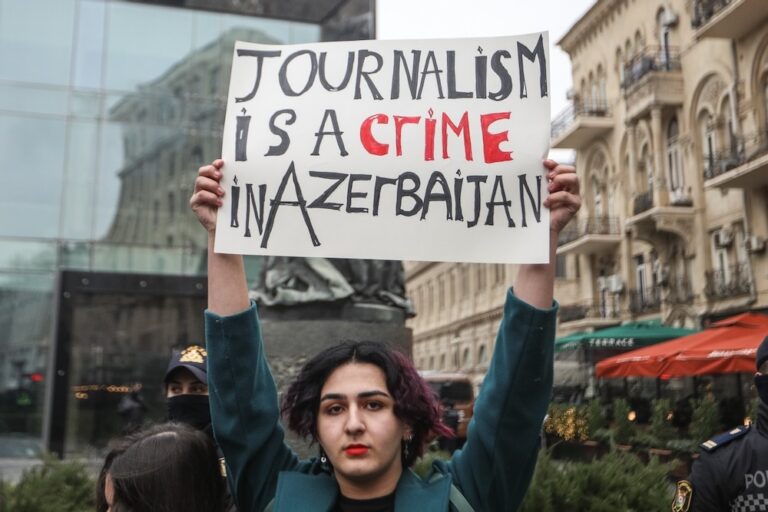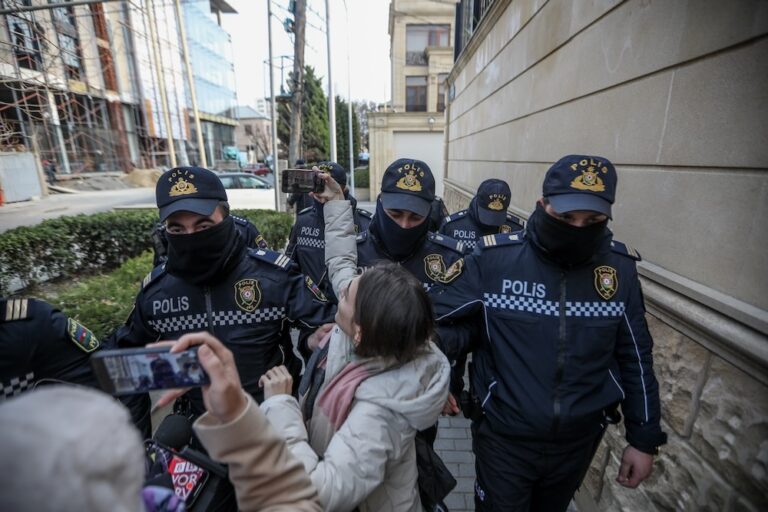(IRFS/IFEX) – On 7 April 2008, “Azadlig” newspaper correspondent Agil Khalil became the target of a nationwide negative public relations campaign that is likely to endanger his life. This development appears to be the continuation of a series of attacks on the journalist related to his work. At approximately 6:00 p.m. (local time), Azerbaijan’s state […]
(IRFS/IFEX) – On 7 April 2008, “Azadlig” newspaper correspondent Agil Khalil became the target of a nationwide negative public relations campaign that is likely to endanger his life. This development appears to be the continuation of a series of attacks on the journalist related to his work.
At approximately 6:00 p.m. (local time), Azerbaijan’s state TV channel AZTV began broadcasting footage in which three people claim that Khalil is a homosexual. Shortly after, two other stations – Lider and Space – began showing the same footage, which was reportedly provided to them by the Chief Prosecutor’s Office.
Khalil was previously beaten on 22 February, while trying to investigate the cutting down of trees in “Zeytun Baglari” (Olive Gardens) in Baku, and then was stabbed in the chest on 13 March.
IRFS notes that this turn in Khalil’s case is not completely unexpected. During an emergency press conference conducted in IRFS’ office on 4 April, “Azadlig” newspaper director Azer Ahmedov announced that investigators looking into the prior attacks on Khalil traveled to Kurdemir, a region in central Azerbaijan, and interrogated Khalil and his mother until 1:30 a.m. During the interrogation, Khalil was shown a video of a male named “Sergei” who claimed to be Khalil’s former lover, and was told that he had three options: to claim that one of his co-workers from “Azadlig” newspaper stabbed him; to claim that his homosexual lover, as depicted in the video, stabbed him; or a third option that Ahmedov did not wish to disclose. The journalist was reportedly told that if he did not agree, the compromising and – according to Khalil – bogus interview regarding his alleged homosexual relations would be broadcast on television.
The footage shown on AZTV depicts “Sergei”, who claims to have stabbed Khalil on 13 March out of jealousy, and a driver who says that he transported “Sergei” to the place outside the Appellate Court where Khalil was stabbed. The driver claims that as he drove past the court, “Sergei” called Khalil over to the vehicle. Khalil got inside and an argument broke out in the back seat between the two, during which the stabbing occurred.
IRFS is enormously concerned about the safety and wellbeing of Khalil and all employees of “Azadlig”. IRFS calls on local and international law enforcement agencies to take stringent measures to ensure the safety of Khalil and his colleagues and family, including measures against a new wave of harassment and possible assaults which, considering that homosexuality is not widely accepted in Azerbaijan, could occur as a result of the broadcast footage.
IRFS also urges local law enforcement agencies to conduct thorough, independent investigations into the two separate attacks on Khalil. IRFS recommends that international organizations and allies of Azerbaijan offer Azerbaijan’s law enforcement agencies assistance in solving these cases, much like they did with the murder of “Monitor” journal chief editor Elmar Huseynov in 2005. This could act as a preventive measure, to prevent a repeat of the events of 2005.
IRFS emphasizes that, regardless of what precipitated the 13 March stabbing, the fact remains that on 22 February 2008 two men who have been identified from photographic evidence of the attack as National Security Ministry Colonel Akif Chodarov and Dagbeyi Allahveridyev, the brother of “Zeytun Baglari” Department’s Chief, beat Khalil and interfered with the journalist’s professional work, and these people need to be prosecuted to the furthest extent of the law.
IRFS notes that damaging the reputations of dissidents by claming they are homosexual, use drugs, are from some undesirable ethnicity, and so on, is nothing new in the countries of the former Soviet Union. Therefore, the validity of the claims made in today’s footage can in no way be assured. Ahmedov told IRFS that Khalil vehemently denies that he is homosexual or has ever been involved in a homosexual relationship. The two of them assess the allegations to the contrary as direct pressure on Khalil and “Azadlig” newspaper. IRFS suspects this could be part of a campaign ultimately intended to permanently silence and close “Azadlig”, one of a very few independent newspapers left in Azerbaijan.
IRFS reminds the local and international community that press freedom in Azerbaijan is in a horrible state, and interventions are urgently needed. Khalil’s case is just one example of the countless ways through which journalists and media institutions in Azerbaijan are oppressed. At present there are four wrongfully imprisoned journalists in Azerbaijan; Sakit Zahidov, Eynulla Fatullayev, Ganimet Zahid, and Mushfig Huseynov. Journalists receive death threats, are beaten, and even murdered, but no one is held responsible for these incidents. Financial means are also used to stifle the opposition and independent press. In light of this, IRFS calls on Azerbaijan’s government to immediately cease its oppression of freedom of the press and to fulfill its obligations in the areas of human rights and freedom of the press. IRFS calls on the international community to demand that Azerbaijan fulfill its obligations in the areas of human rights and freedom of the press, and, in the event that this is not done, to enact real, tangible sanctions against Azerbaijan’s government.
Updates the Khalil case: http://ifex.org/en/content/view/full/91640


